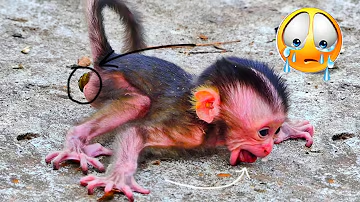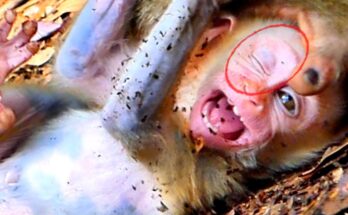
Rozy, a young female known for her shy and unpredictable nature, had been showing signs of labor since early morning. Many observers had been closely monitoring her, hoping for a safe and healthy birth. She had wandered off from the troop, as mothers often do when the time is near, and quietly delivered her baby under the shade of a thick bush, far from the others.
The infant — a hybrid, showing mixed traits between species — was tiny but alert, with wide eyes and an unmistakable innocence. But instead of the warm embrace that all newborns deserve, the baby was met with distance. Rozy, visibly tired and seemingly confused, sniffed the baby briefly before stepping away.
At first, everyone thought she would return after a short rest. But minutes turned into hours, and Rozy showed no signs of maternal behavior. She wandered back toward the troop, leaving the fragile newborn alone, cold, and crying softly.
Observers and caretakers were stunned. Maternal rejection is not unheard of in the wild, especially among first-time or stressed mothers. But the pain of watching a newborn lie helplessly abandoned is something that pierces deeply into the hearts of all who witness it.
Some speculate that the baby’s hybrid appearance might have confused Rozy, causing an instinctual disconnection. Others believe Rozy may have been overwhelmed, afraid, or unprepared for motherhood. Whatever the reason, the outcome was the same — a newborn left to fend for itself with no warmth, no food, and no protection.
Luckily, wildlife caretakers nearby acted swiftly. They gently retrieved the baby, wrapped it in a soft cloth for warmth, and offered emergency care. While the little one is still fragile, early signs are promising — it has responded to human touch and accepted formula. For now, the focus is on keeping the baby alive and healthy.


